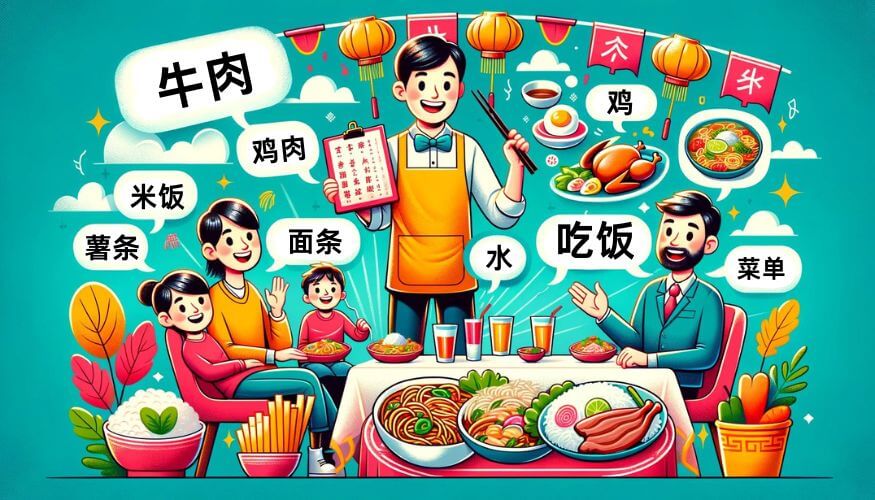What’s for Dinner? Ordering Food in Mandarin

Introduction
Welcome back to our fun-filled Mandarin learning series! Today, we’re diving into the delicious world of food. Whether you’re a foodie or just looking to survive your next trip to a Chinese restaurant, knowing how to order food in Chinese is a must. Get ready for some tasty phrases and hilarious role-plays!
Key Vocabulary
Before we get to the funny stuff, let’s learn some essential food-related vocabulary:
- 菜单 (Càidān) – Menu
- 服务员 (Fúwùyuán) – Waiter/Waitress
- 饮料 (Yǐnliào) – Drink
- 水 (Shuǐ) – Water
- 米饭 (Mǐfàn) – Rice
- 面条 (Miàntiáo) – Noodles
- 鸡肉 (Jīròu) – Chicken
- 牛肉 (Niúròu) – Beef
- 猪肉 (Zhūròu) – Pork
- 蔬菜 (Shūcài) – Vegetables
How to pronounce these words?
Pronunciation Guide for Beginners
菜单 (Càidān) – Menu
- Cài: Pronounce it like “tsai” with a rising tone, similar to saying “tsai” while your pitch goes from low to high.
- Dān: Pronounce it like “dan” with a high level tone, as if you’re holding a steady note.
服务员 (Fúwùyuán) – Waiter/Waitress
- Fú: Pronounce it like “foo” with a rising tone, as if you’re asking a question.
- Wù: Pronounce it like “woo” with a falling tone, starting high and ending low.
- Yuán: Pronounce it like “ywen” with a rising tone, similar to the sound in “when” but starting with a “y” sound.
饮料 (Yǐnliào) – Drink
- Yǐn: Pronounce it like “yin” with a falling-rising tone, starting mid, dipping down, and then rising.
- Liào: Pronounce it like “liao” with a falling tone, starting high and ending low.
水 (Shuǐ) – Water
- Shuǐ: Pronounce it like “shway” with a falling-rising tone, starting mid, dipping down, and then rising.
米饭 (Mǐfàn) – Rice
- Mǐ: Pronounce it like “mee” with a falling-rising tone, starting mid, dipping down, and then rising.
- Fàn: Pronounce it like “fan” with a falling tone, starting high and ending low.
面条 (Miàntiáo) – Noodles
- Miàn: Pronounce it like “mian” with a falling tone, starting high and ending low.
- Tiáo: Pronounce it like “tyao” with a rising tone, starting low and going high.
鸡肉 (Jīròu) – Chicken
- Jī: Pronounce it like “jee” with a high level tone, as if you’re holding a steady note.
- Ròu: Pronounce it like “row” with a falling tone, starting high and ending low.
牛肉 (Niúròu) – Beef
- Niú: Pronounce it like “nyo” with a rising tone, starting low and going high.
- Ròu: Pronounce it like “row” with a falling tone, starting high and ending low.
猪肉 (Zhūròu) – Pork
- Zhū: Pronounce it like “joo” with a high level tone, as if you’re holding a steady note.
- Ròu: Pronounce it like “row” with a falling tone, starting high and ending low.
蔬菜 (Shūcài) – Vegetables
- Shū: Pronounce it like “shoo” with a high level tone, as if you’re holding a steady note.
- Cài: Pronounce it like “tsai” with a falling tone, starting high and ending low.
These explanations use tones to help you understand the pitch variations in Mandarin Chinese. Mandarin has four tones: high level (1st tone), rising (2nd tone), falling-rising (3rd tone), and falling (4th tone). Practicing these will help you sound more natural when speaking Chinese.
Common Phrases for Ordering Food
Here are some handy phrases to use when ordering food in Mandarin:
- 我要点菜 (Wǒ yào diǎn cài) – I want to order food.
- 请给我菜单 (Qǐng gěi wǒ càidān) – Please give me the menu.
- 我要一杯水 (Wǒ yào yì bēi shuǐ) – I want a glass of water.
- 我想要一份鸡肉 (Wǒ xiǎng yào yí fèn jīròu) – I would like a serving of chicken.
- 请给我推荐一个菜 (Qǐng gěi wǒ tuījiàn yí gè cài) – Please recommend a dish to me.
Hilarious Restaurant Role-Plays
Let’s put these phrases to use with some humorous restaurant scenarios:
Scenario 1: The Confused Customer
- You: 请给我菜单。 (Qǐng gěi wǒ càidān.)
- Translation: Please give me the menu.
- Waiter: 这是菜单。 (Zhè shì càidān.)
- Translation: Here is the menu.
- You: 我要一份水,一杯米饭,还有一碗鸡肉。 (Wǒ yào yí fèn shuǐ, yì bēi mǐfàn, hái yǒu yì wǎn jīròu.)
- Translation: I want a serving of water, a glass of rice, and a bowl of chicken.
- Waiter: 您确定吗? (Nín quèdìng ma?)
- Translation: Are you sure?
Scenario 2: The Overly Enthusiastic Eater
- You: 我要点菜!给我所有的饮料和每种肉一份! (Wǒ yào diǎn cài! Gěi wǒ suǒyǒu de yǐnliào hé měi zhǒng ròu yí fèn!)
- Translation: I want to order! Give me all the drinks and one of each kind of meat!
- Waiter: 您确定能吃完吗? (Nín quèdìng néng chī wán ma?)
- Translation: Are you sure you can finish it all?
- You: 我是超级大胃王! (Wǒ shì chāojí dà wèi wáng!)
- Translation: I’m a super big eater!
Conclusion
Ordering food in Mandarin doesn’t have to be intimidating. With these phrases and a sense of humor, you’ll be a pro in no time. Practice these scenarios with friends or family for some laughs and tasty fun. Stay tuned for our next post, where we’ll learn how to tell time in Mandarin. Until then, happy eating and happy learning!
This post is designed to make learning Mandarin both educational and entertaining, helping readers remember the vocabulary and phrases while enjoying a good laugh.






